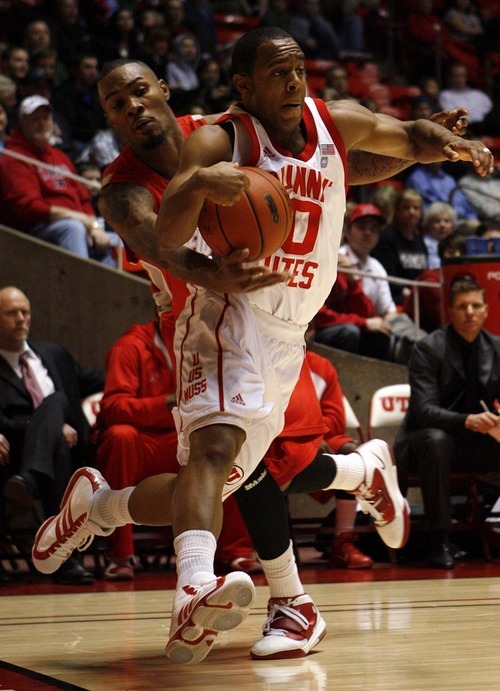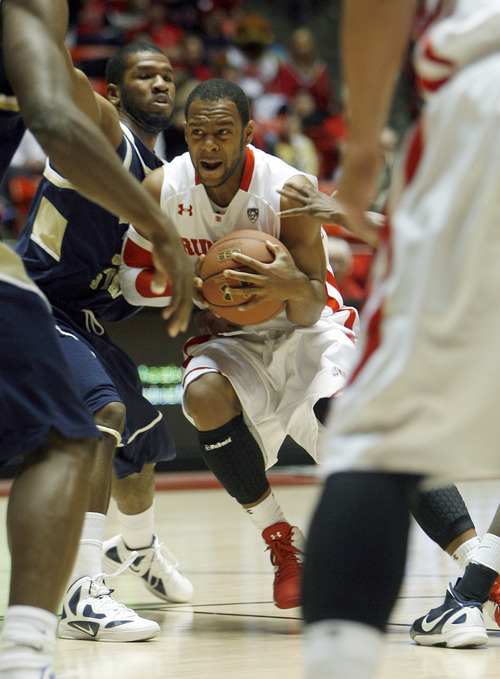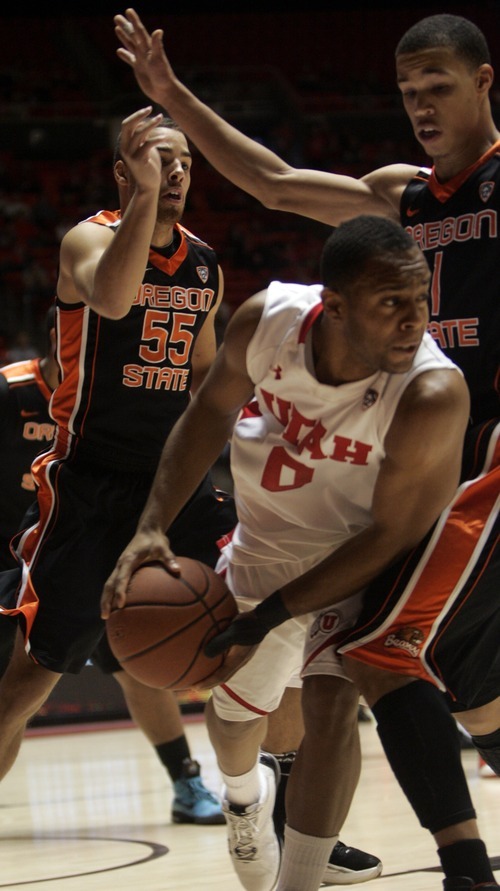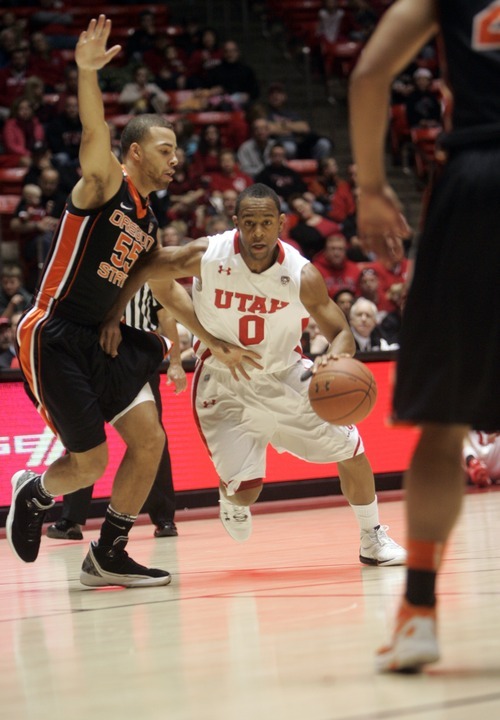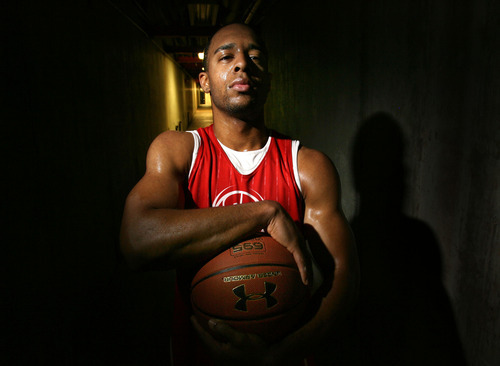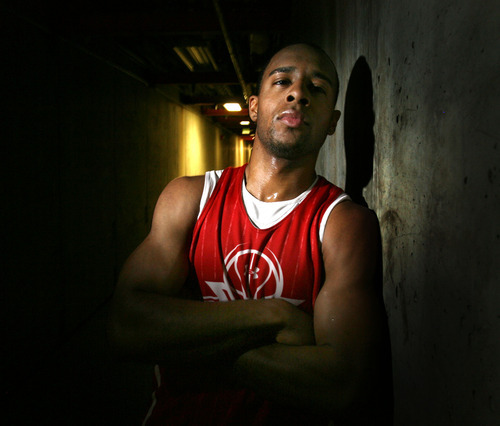This is an archived article that was published on sltrib.com in 2012, and information in the article may be outdated. It is provided only for personal research purposes and may not be reprinted.
From behind a door deep in a Los Angeles arena last month, Chris Hines emerged with black headphones wrapped around his neck, his fractured left thumb freed from its special sleeve and his right ankle wrapped in enough ice to ship fresh fish.
Coming off a 62-45 loss to USC — maybe Utah's most discouraging of the season — Hines limped over to a small group of reporters, one of whom observed that one day someone would have to push him out of the locker room in a wheelchair.
"I wish they did tonight," Hines said.
The junior guard, who will lead the Utes at Arizona State on Thursday, has been ravaged by injuries: to his ribs, his elbow, thumb and, during a practice between losses in L.A., his ankle. During a season of 18 losses and counting, the 22-year-old Hines has become an old man.
Once a reserve for Larry Krystkowiak, Hines is now the Utes' second-leading scorer at 8.9 points per game and, perhaps, their most important player. Four of them remained after coach Jim Boylen was fired last spring, but that group has been cut to two. Through injuries and attrition, Hines' role has expanded from volume shooter to the careful, wispy voice of a team.
"I think he's a good influence on guys on how you go about your business," Krystkowiak said.
Maddeningly inconsistent, capable of scoring 20 points one game and missing every shot he takes in the next — as he did in two games last week — Hines' leadership has little to do with his statistics.
Hines has missed just two games with his injuries. He insists on playing, even when hurting.
For that he credits his grandfather — a landscaper who worked through broken bones, so, one old man like the other, Hines has spent his life fighting back. It's held true throughout a complicated journey, whether he was punching his way out of schoolyard confrontations over a debilitating stutter or blocking the pain of nagging basketball injuries.
'Don't talk to that dude'
Lance Alexander looked out a window of Klein Forest High School into the dark and through the sleet of a rare Houston winter storm. He watched a figure slog through the field in front of the school on a bicycle.
Hours earlier, Chris Hines missed two free throws in a game that would have given the Golden Eagles first place in their district. Now Alexander, an assistant coach on the team, watched the 16-year-old Hines park his bicycle near the back door of the school. With a swift kick, Hines popped the door's latch, and stepped into the building.
He retrieved from a closet the basketball he hid for nights like these, often three times a week. From a spot in the stands where they couldn't be seen, Alexander and head coach Cary Black watched Hines shoot free throws for an hour and a half.
Dribble, dribble … swish. Dribble, dribble … swish.
"Every time he missed one," Alexander said, "he either did wind sprints or pushups. He wasn't going to let that happen again."
When Alexander first started watching Hines as a sixth grader, the young guard was deeply affected by a stutter. As a result, he rarely spoke at all. Educators labeled him "special ed."
Before high school, Alexander told Hines and his mother, Wanda, that he could one day play in college, but not if he was in special ed for a speech impediment.
Hines went back to regular classes, where throughout high school he collected report cards filled with A's and B's.
"I'm not dumb," Hines remembered thinking as a child. "I know all the material that everybody else is doing, but I just can't talk about it like they can."
And other kids noticed.
"Don't talk to that dude," they said. "He can't talk."
Hines' response was simple: "Let's fight."
Hines still stutters, words often sticking in his throat before he says them, but there's no hesitation.
"I wish I didn't stutter," Hines said, "but at the same time, it is who I am."
'I just kept working'
With divorced parents, Hines spent various stages of his childhood living with each. And just as much time was spent with his grandparents in their Houston neighborhood of Studewood, which he describes as full of homes that once belonged to slaves and servants; streets that you avoided after dark because of the bad houses. The crack houses.
Once he was old enough, Hines started going to work with his grandfather, Harvest Jones.
"It made me realize that a broken bone can't stop you from doing anything," Hines said. "Mentality is the only thing that can stop you from doing it."
Now 73, Jones traveled on an airplane for the first time last week. He came to Salt Lake City and watched his grandson score 20 points against Oregon, then just one against Oregon State.
Earlier in the week, Hines was questionable to play because of his ankle. But he wasn't going to miss a game because of the injury. Not with his grandfather in the stands, the man who once went back to work after breaking his wrist.
"I never really thought too much 'bout it," Jones said last week. "I just kept working."
Pushing through
After practice Monday, Hines stayed long after the Huntsman Center floor had cleared of players. He shot 3-pointers with an assistant coach until it was time to turn his attention to the media.
Years ago, he had to be prodded to speak. Now, he's a spokesman.
Hines no longer has to break into the gym — it's available to him whenever he wants.
"If you come in here at some odd hours, like some off-class hours, he's here shooting," Utah guard Cedric Martin said. "He comes in here early before games and shoots and nobody sees him."
When he was finished Monday, Hines turned toward the small training room under the first rows of arena seats. Inside awaited an endless supply of ice and a machine that would soothe his ankle. When he reached the door, Hines pushed through, as he has always done.
boram@sltrib.comTwitter: @oramb —
The Chris Hines file
Age • 22
Hometown • Houston
Position • Guard
Points per game • 8.9
Memorable moment • On Feb. 16, 2011, Hines banked in a 25-foot 3-pointer to beat New Mexico in The Pit. Utah hasn't won on the road since. —
Utah at Arizona State
P At Wells Fargo Arena (Tempe, Ariz.)
Tipoff • Thursday, 6:30 p.m.
TV • None
Radio • 700 AM
Records • Utah 5-18 (2-9); ASU 7-16 (3-8)
Series • Utah, 26-18
Last meeting • Utah, 64-43 (Jan. 21)
About the Utes • Utah has lost four straight games since beating the Sun Devils at home Jan. 21. Cedric Martin led the Utes with 17 points in that game. … Center Jason Washburn leads the Utes with 10.4 points and 6.3 rebounds per game. The junior had a career-high eight blocks Saturday against Oregon State. … The Utes' 18 losses have been by an average of 14.7 points.
About the Sun Devils • ASU is 1-5 in games without guard Trent Lockett, who is expected to return Thursday from an ankle injury. Lockett leads the team with 13.9 points and 6.4 rebounds per game. … Forward Carrick Felix scored 20 points Saturday in a win over Washington State.


